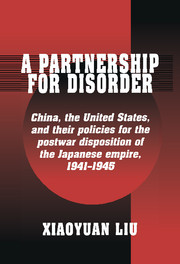 A Partnership for Disorder
A Partnership for Disorder Book contents
- Frontmatter
- Contents
- Acknowledgments
- Note on romanization
- Abbreviations
- Introduction
- 1 The making of an alliance
- 2 The issue of postwar Japan
- 3 China's lost territories
- 4 Korea's independence
- 5 The road to Cairo
- 6 A divisive summit
- 7 Yan'an and postwar East Asia
- 8 Diplomacy without action
- 9 Erosion of a partnership
- 10 The Manchurian triangle
- 11 Bargaining at Moscow
- 12 Epilogue: The crisis of peace
- Appendix I Guiding Plan for Helping the Korean Restoration Movement
- Appendix II Two Chinese documents of the Cairo Conference
- Bibliography
- Index
10 - The Manchurian triangle
Published online by Cambridge University Press: 20 October 2009
- Frontmatter
- Contents
- Acknowledgments
- Note on romanization
- Abbreviations
- Introduction
- 1 The making of an alliance
- 2 The issue of postwar Japan
- 3 China's lost territories
- 4 Korea's independence
- 5 The road to Cairo
- 6 A divisive summit
- 7 Yan'an and postwar East Asia
- 8 Diplomacy without action
- 9 Erosion of a partnership
- 10 The Manchurian triangle
- 11 Bargaining at Moscow
- 12 Epilogue: The crisis of peace
- Appendix I Guiding Plan for Helping the Korean Restoration Movement
- Appendix II Two Chinese documents of the Cairo Conference
- Bibliography
- Index
Summary
Ever since the Chinese–Japanese confrontation escalated into a conflict in the Pacific, Chiang Kai-shek had had feared that the Russians might reap the third party's benefit from the Asian tussle. During the last two years of the war, when the American government worked for Soviet participation in the war against Japan, Chiang saw his fear materializing. Manchuria, where the Japanese militarists had started the Asian crisis, was again destined to occupy the center of Asia's international scene due to its strategic importance for any Soviet military action against Japan. As the Japanese Empire ebbed, rivalry over the future of Manchuria began in earnest within the anti-Axis coalition. Inter-Allied Manchurian diplomacy began right after the Cairo Conference, and its two decisive stages, played out separately in Yalta in February 1945 and in Moscow in July and August of the same year, eventually created a new triangular relationship among Washington, Chongqing, and Moscow. The immediate objective of these diplomatic undertakings was Soviet entry into the war against Japan, but the governments involved also sought to readjust their long-term interests in Manchuria and China.
Chongqing's effort to enlist American support
Chongqing was not well prepared for the new round of competition for Manchuria. The Cairo decision on Manchuria in favor of China's sovereignty did not encourage any substantial progress in Chongqing's post-conference policy preparation for recovering the region. Chinese military authorities never developed a plan for reconquering the area.
- Type
- Chapter
- Information
- A Partnership for DisorderChina, the United States, and their Policies for the Postwar Disposition of the Japanese Empire, 1941–1945, pp. 231 - 257Publisher: Cambridge University PressPrint publication year: 1996


